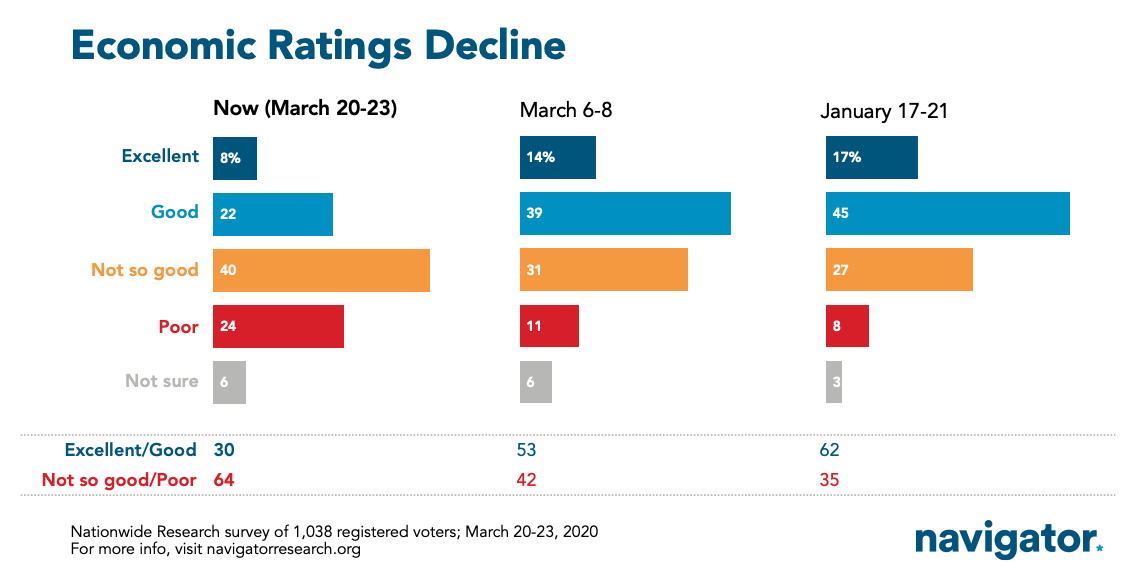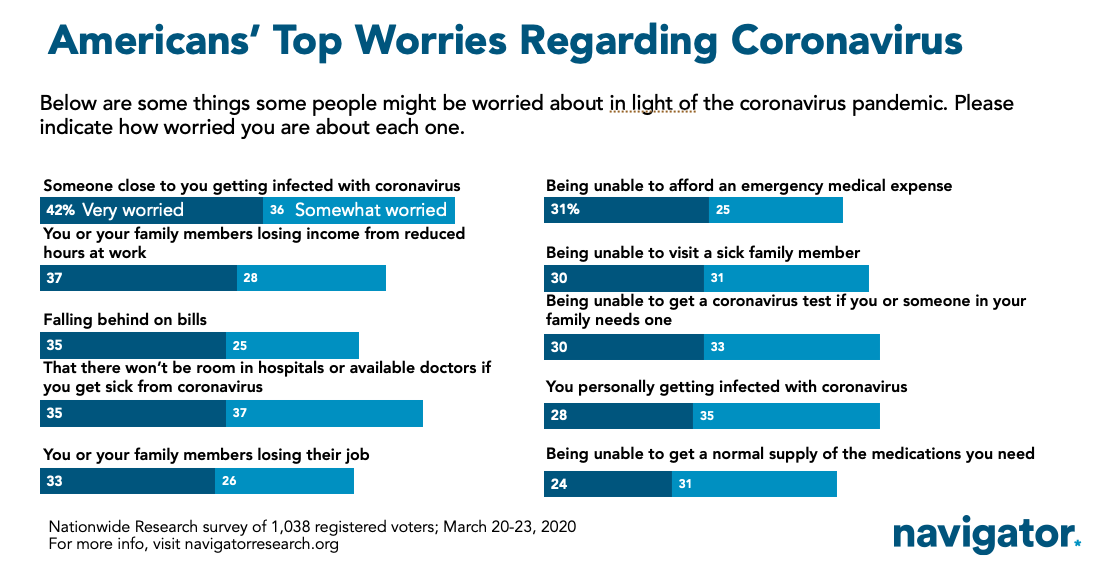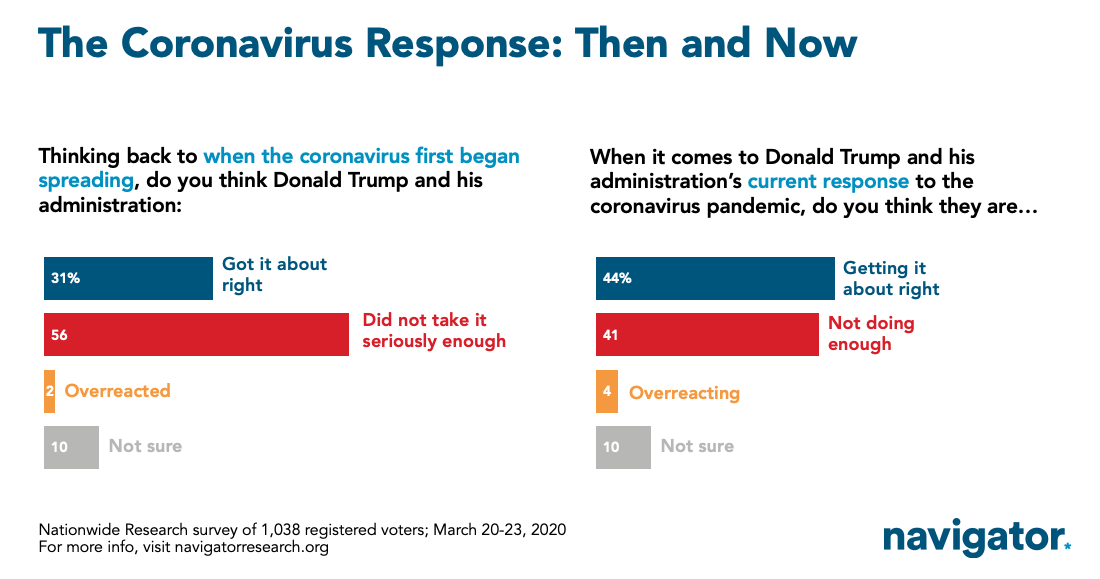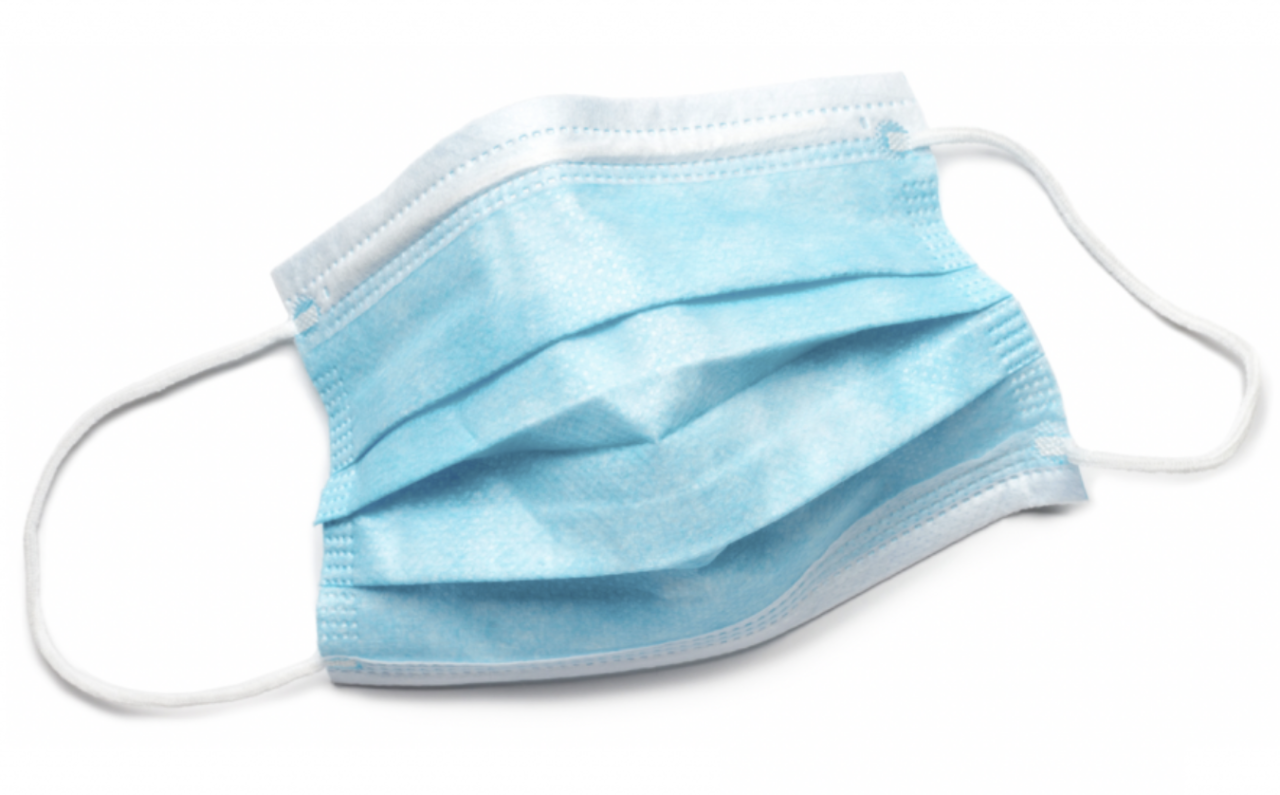Welcome to NAVIGATOR – a project designed to better understand the American public’s views on issues of the day and help advocates, elected officials, and other interested parties understand the language, imagery, and messaging needed to make and win key policy arguments.
This is a dynamic time, and as a result, Navigator will transition to a daily tracking poll on the coronavirus crisis. For the foreseeable future, we will be tracking public opinion every weekday, releasing on a Tuesday-Saturday schedule. In addition, future editions will provide more messaging guidance to the progressive community.
This inaugural edition of our daily tracking release features findings from a national online survey of 1,038 registered voters conducted March 20-23, 2020.
Key Takeaways
- Americans increasingly recognize the severity of the crisis, with a dramatic change in the way they perceive the state of the national economy
- The public is anxious about the crisis, viewing personal and family health as a top concern – speaking in a way that meets people where they are is critical at this time
- A majority approve of Trump’s handling of the crisis, but there are warning signs for the president as it progresses.
Public opinion is catching up to the reality of the crisis.
Americans are increasingly aware of, and concerned about, the pandemic. More than two thirds (70%) now think the outbreak is a major crisis, more than double the 33% who believed this just two weeks ago (the previous Navigator poll was conducted March 6-8). Nearly three quarters (74%) now also think the worst is “yet to come,” a 21-point increase since that poll. More than nine in ten (93%) Americans have engaged in some form of social distancing in response to the coronavirus pandemic, including:
- 77% are avoiding public events and gatherings;
- 74% are avoiding going out to restaurants and bars;
- 64% are going to the grocery store or supermarket less often; and,
- 59% are avoiding in-person interactions with friends or family.
Despite this level of concern, relatively few report it has impacted their personal health – so far. Only 9% of Americans know someone who has been infected with coronavirus. Two percent of Americans say they have wanted to and have successfully gotten tested, while 4% say they wanted to but were unable to get tested.
The economic crisis this pandemic presents is rapidly becoming clear.
After a long period of positive feelings about the economy, Americans are starting to realize the economic implications of the pandemic. Only 30% of Americans say the economy is excellent or good, a massive 23-point decline from 53% in Navigator’s March 6-8 survey, and down 32 points from January (62% excellent/good). Additionally, over three quarters (77%) say the economy is either already in a recession (29%) or headed towards one (48%).

The economic impact is not only being felt nationally, but personally. A majority (60%) of Americans are now uneasy about their personal financial situation, up 13 points from earlier in March (47%). This includes 72% of Democrats, 78% of independents, and 41% of Republicans who are uneasy.
- Forty-one percent (41%) of Americans say someone they know personally has lost their job due to the pandemic.
- Six-in-ten (61%) say they know someone who has lost hours at work as a result of the crisis.
- Fully 9% of Americans report having personally lost their job due to the coronavirus pandemic.
The public is gripped by anxiety and fear. In speaking about the crisis, it is paramount to meet people where they are.
People are afraid, both about the potential health consequences impacting themselves or their families, as well as the economic strain this crisis may have on the economy. From a list of eight words describing their emotional state regarding the coronavirus pandemic, the highest number of respondents (47%) chose “afraid.”
- When asked which they are more worried about, nearly two-thirds (64%) say their own and their family’s health and well-being, as opposed to 36% who say it is their financial situation.
- However, when we nationalize the question, Americans are split between fearing the “impact of coronavirus on the economy as a whole” (51%) and the “impact of coronavirus on people’s health” (49%).
Americans are currently more worried about the health of those close to them than their own. Navigator presented respondents with a list of items and asked which they are worried about in light of the pandemic. More Americans say they are worried about someone close to them getting infected with coronavirus (42% very worried) than they are themselves (28% very worried). Top financial worries are related to keeping up with the day-to-day – including losing income from reduced hours (37% very worried) and falling behind on bills (35%).

President Trump’s approval rating on his handling of the pandemic is net positive, but there are warning signs for the president as the crisis progresses.
New support from Democrats around the president’s handling of the crisis helps drive his higher-than-usual ratings. A slight majority of the public approves of Trump’s handling of the coronavirus pandemic (52% approve; 42% disapprove), giving the president a rare positive approval rating on an issue. Driving that rating is a 24% approval rating with Democrats, significantly higher than he normally receives.
- By comparison, Trump’s overall approval rating with Democrats in the last three Navigator polls ranged from 7% to 10%.
- Trump’s coronavirus approval rating with Republicans (89%) largely matches his overall approval rating in recent Navigator tracking polls (84% to 88%).
Trump’s overall approval rating remains net negative (47% approve; 49% disapprove), though this too is a significant improvement from Navigator’s early March survey (41% approve; 56% disapprove) and the highest approval rating Trump has received in two years of monthly Navigator tracking. As the crisis continues, it will be important to watch these numbers, especially with Democrats, to see if it lasts or is temporary.
Why the improvement? Americans may be making a relative comparison to Trump’s early missteps as it is clear that Trump’s initial efforts on coronavirus are viewed far more negatively than his present efforts. Trump and his administration get poor marks for their early performance – a majority (56%) say they did not take coronavirus seriously enough at first, while just 31% say they got it about right. On the other hand, their present performance is more mixed with a plurality of voters (44%) saying they are getting it about right and 41% of Americans saying they are not doing enough now

